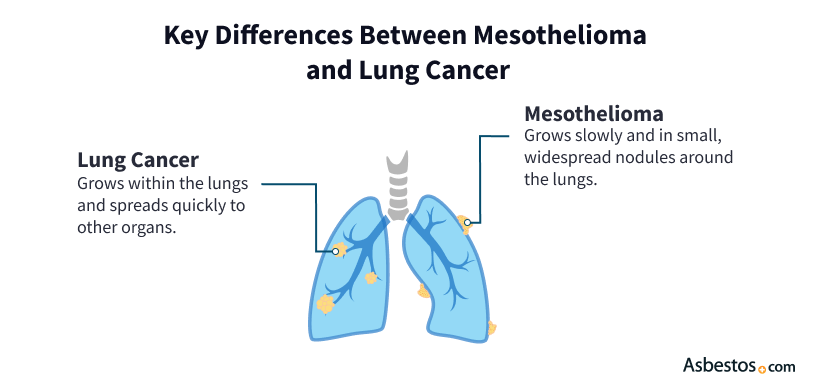When Boudreaux was diagnosed with mesothelioma in 2014, he wasn’t a surgical candidate because of a previous surgery for non-small cell lung cancer. He had a piece of lung removed the year before on the opposite side of the chest from where the mesothelioma was found.
Mesothelioma vs. Lung Cancer
Inhaling asbestos fibers can cause mesothelioma and lung cancer. But they’re distinct cancers. Mesothelioma forms in the mesothelium, which is the lining around the lungs, abdomen, heart and testes. Lung cancer develops inside the lungs.
Differences Between Mesothelioma & Lung Cancer Development
There are significant differences in where, how often and in what form mesothelioma and lung cancer tumors develop. Asbestos exposure is a risk factor in the development of both types of cancer. But asbestos is the primary cause of mesothelioma. And while asbestos can be a risk factor for lung cancer, its No. 1 risk factor is smoking.
How Lung Cancer and Mesothelioma Develop Differently
- How often it develops: While lung cancer is the No. 2 most commonly diagnosed cancer in the U.S., fewer than 3,000 cases of mesothelioma are diagnosed each year.
- What form tumors take: Mesothelioma begins as small nodules. They can grow together into a sheath-like tumor around the lung. Lung cancer develops in larger, individual tumors with defined boundaries.
- Where tumors start: Mesothelioma tumors begin in the tissues lining organs. Lung cancer tumors develop within tissue inside the lung, usually near the airways or small air sacs.
- Where tumors spread: Mesothelioma tends to remain near where it first developed. Lung cancer spreads or metastasizes early to other organs.
Because the most common type of mesothelioma develops in the lining of the lung, it’s sometimes mistakenly referred to as “mesothelioma lung cancer.” But mesothelioma isn’t a type of lung cancer.
Because mesothelioma is so rare, there are fewer doctors familiar with treating it, making finding a mesothelioma specialist important. As thoracic surgeon Dr. Jacques Fontaine of Moffitt Cancer Center tells us, “For every mesothelioma case we diagnose, we diagnose 95 lung cancers.”

Similarities Between Mesothelioma and Lung Cancer
Mesothelioma and lung cancer are different cancers, but they share some features that can make them seem similar at first. Both are asbestos-related cancers that can develop after many years and may cause the same kinds of symptoms. Looking at how they overlap can help people better understand what makes each unique.
How Lung Cancer and Mesothelioma Are Similar
- Diagnosis and treatment: Imaging scans and biopsies help diagnose both mesothelioma and lung cancer. Treatments for both may include surgery, chemo, radiation and immunotherapy.
- Incidence and mortality: Incidence for lung cancer is mostly tied to smoking rates. But like mesothelioma, areas with histories of heavy asbestos use also have higher lung cancer incidence. Death rates are similar between the two cancers as well.
- Similar symptoms: Mesothelioma and lung cancer share symptoms like chest pain, coughing, trouble breathing, fatigue and weight loss.
- Time to develop: Both cancers often have long latency periods. Lung cancer can take 10 to 30 years, and mesothelioma can take 20 to 60 years to develop after asbestos exposure.
Mortality rates for lung cancer and mesothelioma are similar and often overlap by state. The 5 states with the most mesothelioma deaths also have the most lung cancer deaths. The relative risk of dying from these cancers is similar as well. A 2022 Iranian study found 1.8 lung cancer deaths and 1.92 mesothelioma deaths per 100,000 people.
Even though mesothelioma and lung cancer have some things in common, they’re not the same. Their shared features help explain why they’re sometimes discussed together, but each cancer has its own behavior.

Understand your diagnosis, top doctors and ways to afford care.
Get Your Free GuideDiagnosing Mesothelioma and Lung Cancer
Diagnosing mesothelioma and lung cancer involves similar steps. The diagnostic process usually begins with a physical exam. Imaging tests, such as X-rays and CT or PET scans, are typically done.
But scans alone can’t tell the difference between lung cancer and mesothelioma. A biopsy is needed to confirm a diagnosis. Your doctor may perform a biopsy via a bronchoscopy, needle aspiration or thoracoscopic surgery.
Biopsies to Diagnose Lung Cancer or Mesothelioma
- Bronchoscopy: Your doctor inserts a tiny camera down your throat and airways to detect abnormalities like tumors. They may collect and test a cell sample for cancer.
- Needle biopsy: Done under local anesthesia, it involves placing a small needle into the tumor. An ultrasound machine or a CT scan can visualize it.
- Thoracoscopic surgery: A solid tissue sample is collected using a small camera inserted between your ribs. Fluid buildup is suctioned out for testing, but this isn’t a reliable way to confirm a diagnosis.
Most people with pleural mesothelioma will either show pleural thickening or effusion. Pleural thickening is extensive scarring in the chest cavity lining. Pleural effusion is fluid buildup in the chest cavity. Pleural thickening may not appear in lung cancer, but both exhibit pleural effusion.

Get help paying for mesothelioma treatment by accessing trust funds, grants and other options.
Get Help NowTreating Mesothelioma and Lung Cancer
Mesothelioma and lung cancer share treatment options. These often include surgery, immunotherapy, radiation or chemo. And clinical trials often test similar therapies for both like gene therapy, photodynamic therapy and cryotherapy.
With lung cancer, surgeons may remove the cancerous lobe of the lung with a lobectomy. Mesothelioma surgeons might remove the pleural lining of the lungs in a pleurectomy and decortication.
Dr. Fontaine tells us mesothelioma surgery is more difficult. He explains, “The fundamental difference is the fact that mesothelioma starts in the lining around the lung. It’s more technically challenging and difficult for us to surgically remove the cancer in mesothelioma compared to lung cancer.”
Radiation may be slightly less effective for lung cancer treatment than for mesothelioma. A 2021 study found 76% of recurring mesothelioma tumors remained under control a year after radiation. But 74% of recurring lung cancer tumors remained under control a year after radiation.
Prognosis for Mesothelioma vs. Lung Cancer
While mesothelioma and lung cancer are both serious cancers, the outlook or prognosis for mesothelioma tends to be poorer. However, an individual’s outlook depends on many factors, including age at diagnosis, responsiveness to treatment and overall health.
Survival rates for lung cancer and mesothelioma are similar, at around 1 year. About 55% of people with lung cancer and 53.4% of people with mesothelioma survive 1 year after diagnosis. The 5-year survival rate is 28% for people with lung cancer and 12% for people with mesothelioma.
The higher incidence of lung cancer cases means more widespread access to specialized treatment centers and doctors. Mesothelioma is much rarer, leaving patients with fewer options to improve their prognosis.
Common Questions About Mesothelioma Vs. Lung Cancer
- Is mesothelioma a form of lung cancer?
-
No, mesothelioma is not the same as lung cancer. Mesothelioma is a cancer of the pleura, which is the lining around the lungs. However, because both lung cancer and mesothelioma arise within the chest cavity (thorax), mesothelioma is sometimes incorrectly called a “lung cancer.” Adding to the confusion, many lung cancer specialists also treat mesothelioma and vice versa.
Answered By: Anna Nowak, internationally renowned asbestos researcher and mesothelioma advocate
- What are the warning signs of mesothelioma?
-
The earliest signs of mesothelioma include:
- Shortness of breath
- Chest pain or discomfort
- Persistent cough
- Fever or night sweats
- Nausea, vomiting or diarrhea
- Abdominal pain or swelling
- Lack of appetite or weight loss
- Should you see a mesothelioma specialist if you have asbestos-related lung cancer?
-
Yes, pleural mesothelioma doctors have expertise in diagnosing and treating several asbestos-related diseases. They understand the complexities of lung cancer caused by asbestos. Top mesothelioma doctors can connect you with clinical research trials and specialized treatments.




